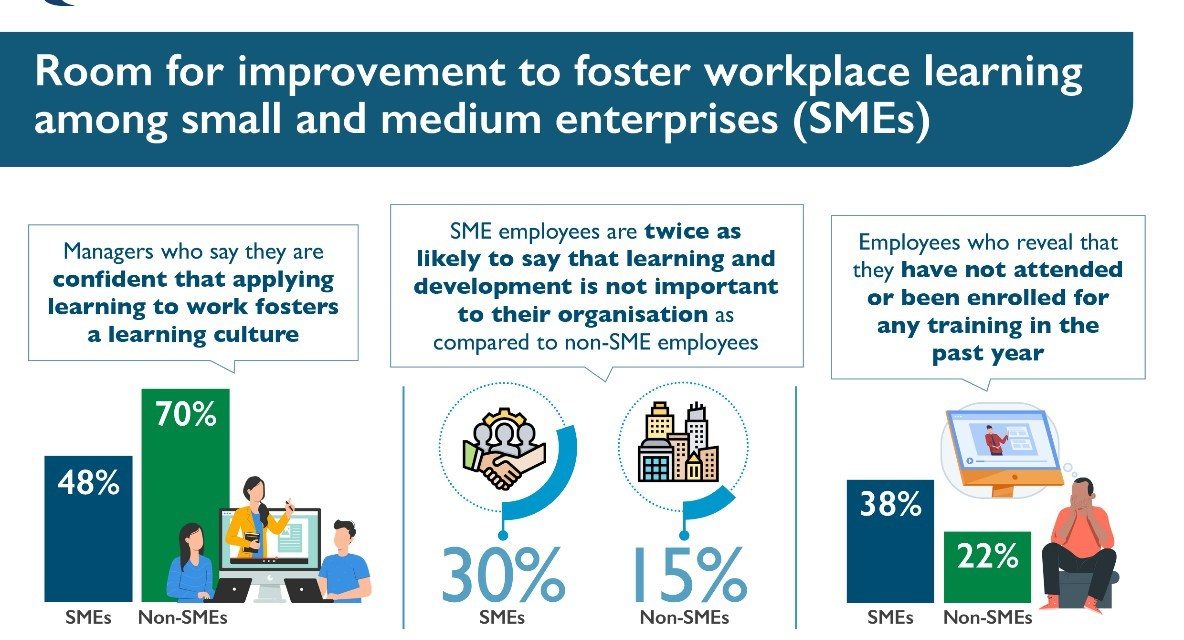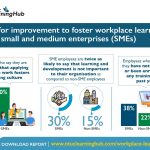Room for improvement to foster workplace learning among small and medium enterprises (SMEs)
Only half (48%) of managers surveyed from Small and Medium Enterprises (SMEs) are confident that applying learning to work fosters a learning culture, as compared to most managers (71%) from larger companies. SME employees are twice as likely (30%) to say that learning and development is not important to their organisation as compared to non-SME employees (15%) while two in five (38%) of SME employees reveal that they have not attended or been enrolled for any training in the past year, as compared to one in five (22%) from non-SME employees.
Learning and development (L&D) is a widely-recognised strategic imperative to attract and retain talent for business sustainability. However, only half (48%) of managers in SMEs are confident that applying learning to work fosters a learning culture, trailing behind most managers (71%) in larger companies who express the same sentiment. SME employees are also twice as likely (30%) to say that L&D is not important to their organisation as compared to those working in non-SMEs (15%).
These are some of the key findings from NTUC LearningHub’s State of Workplace Learning (SWL) Report 2022 launched. The SWL Report 2022 is based on a survey of 450 full-time professionals based in Singapore, including 150 managers and 300 working professionals. It aims to uncover the dual perspective on the role of managers in employee learning and the current and desired states of workplace learning and is a continuation to the Workforce Learning in Workplace Transformation Report 2021.
41% of SME employees say that their organisation does not provide adequate training opportunities for them, which is higher than employees working in larger organisations (26%). In fact, two in five (38%) of SME employees reveal that they have not attended or enrolled for any training in the past year, as compared to the average of one in five (22%) from non-SME employees.
Commenting on the survey sentiments, Yeo Wan Ling, Director of NTUC U SME, says, “SMEs in Singapore face challenges in prioritising training among workers, while expressing concerns over the cost of training and development. As a result, many of them prefer to adopt ‘on-the-job’ training and ‘peer-to-peer’ learning as it complements the operational needs well. However, such arrangements may not have an adequate structured curriculum and framework. To better help workers in SMEs with skills upgrading to raise productivity, the government has introduced measures to provide these SMEs with resources to enable their employees to attend training, such as the provision of funding to offset course fees and enhanced absentee payroll. In addition, SMEs can approach training providers like NTUC LearningHub to enquire about courses and funding opportunities. One such notable programme we have with NTUC LearningHub is the ‘Digital Reboot’ Programme targeted at helping SMEs to digitalise their business to improve their operational efficiency and grow their revenue through digital marketing.”
Commenting on the findings, NTUC LearningHub’s Chief Human Resource Officer, Sean Lim, says, “SMEs do recognise that learning and development is a form of investment that brings tangible benefits for the company. As the economy enters an era of digitalisation and digital transformation post-pandemic, SMEs must take a proactive approach in supporting their employees to upskill and keep pace with the changing economy. Employees in SMEs who are time-starved can consider online learning as an alternative to conventional physical classes, such as through the NTUC LearningHub Learning eXperience Platform (LXP) which serves bite-sized modules, enabling users to learn on-the-go, at their own pace and own time. Given the value of learning and development for businesses, SMEs should work with training providers to identify competency and skills gaps so as to recommend relevant courses for their employees to upskill and/or reskill.”
-PR Newswire












